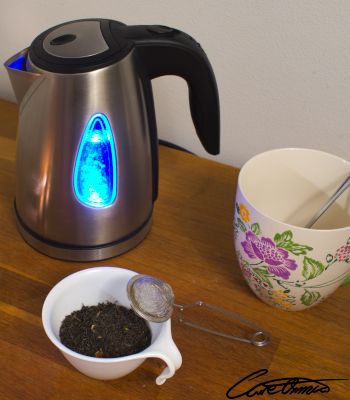Which True Tea Is The Healthiest? (Black, Green, Oolong, White)

Regularly drinking tea has since ancient times been considered as an important health promoting habit.
A study made in 2019, led by researchers from the National University of Singapore (NUS) revealed that regular tea drinkers, compared to non-tea drinkers, had better organized brain regions. Regions that are associated with healthy cognitive functions. (source ◳)
All of the teas taste differently and many tend to drink more of the one they prefer.
That’s quite logical and natural of course but what if you choose between them based on the health benefits they can provide?
Which one of the true teas is the healthiest to drink?
We’ve gone through the research to find out that there's actually one true tea that give you all of the benefits without the caffeine that the others contain.
From a health perspective there's only one true tea that we can recommend.
Table of Contents
Difference Between True Teas And Herbal Teas
Tea is often divided in two groups: True Teas and Herbal Teas.
The true teas, or simply tea, comes from the tea bush, Camellia sinensis, and include green tea, white tea, black tea, and oolong tea.
But there is a misconception, essentially a marketing gimmick, that herbal tea is also tea. Herbal tea isn’t made from the plant Camellia sinensis, and can’t therefore be called tea. (source ◳)
General health benefits that can be ascribed to all true teas
There are some general health benefits that all of the true teas provide. (source ◳)
Benefits from True Teas
- A habit of regular tea consumption can contribute to
- Proper hydration
- Improve focus and concentration
- Help maintain a positive mood throughout the day
- True tea naturally contains zero calories/energy
- Three or more cups of tea per day may help
- maintain cardiovascular health
- maintain healthy blood pressure
- promote normal blood vessel function
- Consumption of true tea may also help prevent chronic diseases like cancer
- True tea is also believed to promote general health
Although all of the true teas provide a wealth of health benefits there are still differences among them that we believe makes them more or less healthy when compared to each other.
The True Tea We Consider As OK From A Health Perspective
Black Tea
Black tea comes from the same bush as green and white tea, Camellia sinensis. The tea leaves are oxidized, which means that some of its nutrients are destroyed.
Black tea is the most processed of the true teas. Nevertheless, with black tea we get flavonoids that protect against cardiovascular disease and cancer, among other things.
Black tea contains caffeine.
Black tea has demonstrated to help sustain alertness throughout the day.
So if you prefer black tea it can improve both your focus and alertness and at the same time have a calming effect. Not bad! (source ◳)
The True Tea We Consider As Good From A Health Perspective
Oolong Tea
Oolong tea is partially oxidized and often described as having blended characteristics of both green and black tea.
Similar to black and green teas, oolong tea contains several vitamins, minerals and helpful antioxidants.
The main antioxidants in oolong tea are known as tea polyphenols, theaflavins and thearubigins.
These polyphenols are responsible for many of its health benefits. (source ◳)
Oolong tea, like black tea, also contains caffeine.
The True Tea We Consider As Better From A Health Perspective
Green Tea
There’s two types of true green tea, the regular one and matcha.
Regular green tea
Green tea is very popular around the world. Antioxidants and other beneficial compounds are better preserved in green tea compared to the black tea because the leaves aren’t allowed to oxidize.
These substances are believed to be able to prevent certain cancers and also act anti-inflammatory.
Green tea is also believed to have beneficial effects in the prevention and treatment of many diseases. For instance non-alcoholic fatty liver disease (NAFLD). (source ◳)
Green tea - matcha
Matcha comes from the same plant as the other true teas. Matcha is a concentrated form of green tea that comes from Japan.
It has gained a lot of attention because of the numerous health benefits it’s believed to provide.
A big difference between Matcha and all other teas is that in ordinary teas, the leaves get infused into the hot water, then the leaves are discarded.
With matcha, you’re drinking the actual leaves, which have been finely powdered and then made into a solution.
It’s been long reputed by enthusiasts that matcha possesses stronger health benefits than other green teas.
Green tea and matcha share the same health benefits, however Matcha has up to 10 times the nutritional value of regular green tea. (source ◳)
But, as with all things, there is a downside, which is that Matcha has a very high concentration of caffeine.
There is three times as much caffeine in a cup of matcha compared to a regular cup of steeped tea.
A cup of matcha actually contains about as much caffeine as you’ll find in a cup of brewed coffee!
Matcha contains the nutrients from the entire tea leaf, which results in a greater amount of caffeine and antioxidants that are typically found in green tea.
The True Tea We Consider As The Healthiest Of Them All
White Tea
White tea comes from the same plant as green and black tea but the leaves are harvested earlier.
As you pick the leaves earlier you end up with a tea that's much more nutrient rich than the other types of teas. And also more expensive.
A cup of white tea can contain up to three times the amount of nutrients as green tea as well as 0 or very low levels of caffeine. The caffeine content increases with the "age" of the leaves. So the very first leaves from the tea bush have very little caffeine in them.
White tea also has the highest concentration of antioxidants of all the true teas. That's because it’s the least processed tea. It's not oxidized, rolled or processed at all.
As white tea provides you with more nutrients, more antioxidants and with none or miniscule amounts of caffeine we consider this to be the healthiest true tea. (source ◳)
Avoid These Common Mistakes To Get The Most Benefits Of Your Tea
Don’t add milk
Many like to drink tea with milk, but if you have milk in tea, your body's ability to absorb flavonoids disappears.
This is because the milk binds up the flavonoids and makes it virtually impossible for your body to utilize them. If you want to drink tea for health reasons, you should always skip the milk. (source ◳)
Avoid drinking black tea directly after a meal
You shouldn't drink black tea directly after eating a meal because the substance, polyphenol, in the tea makes your body's iron absorption from the food more difficult. (source ◳)
Conclusion
Human kind has consumed tea for centuries.
Research proves that it’s good for you.
There are four types of true teas that offer different health benefits.
While you can always have too much of a good thing, tea is a healthy choice for the vast majority of healthy adults.
You should, to get the most benefits from your tea drinking habit, consume between three to five cups of tea per day.
You should also be aware about the caffeine content of the type of tea you consume. 3 cups of tea coupled with a few cups of coffee during a day provides you with quite a lot of caffeine.
All of the true teas are healthy, but in various ways but we choose the white tea as the healthiest of them mainly because of three reasons:
- The leaves contain most nutrients compared to the other teas
- It’s the least processed and therefore has the highest concentration of antioxidants
- It doesn’t add to your daily caffeine intake as it doesn’t contain caffeine
If you haven’t tried one or more of the true teas we’ve listed here we recommend you try them all.
If you’re drinking 3-5 cups of tea per day, why not mix it up some?
Enjoy!



 TM
TM